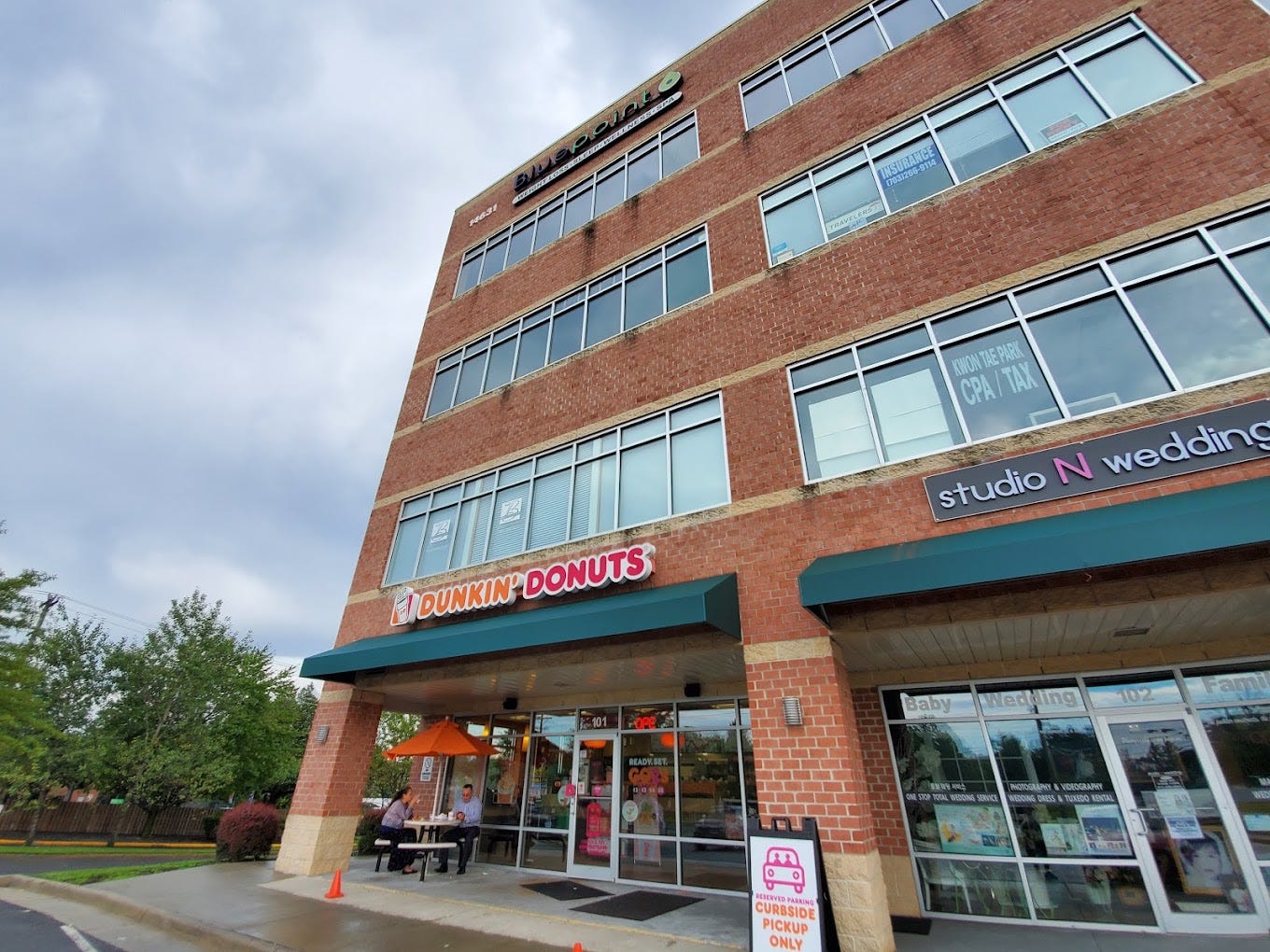Review: Nicholas Jamerson in DC
The musician's musician of Eastern Kentucky brings his Thursdy Best
One unassuming Saturday morning this past June, I was cruising west on I-66 in search of caffeine. I make the drive from DC to the Shenandoah Valley regularly for a bit of reprieve from congestion and, if the sentiment strikes, to spend time with my parents at their place in Lexington. I spotted a Dunkin’ logo by the exit sign and turned off the highway, sensing it was my last opportunity to do something so cosmopolitan as to order an iced coffee on the company’s mobile app before the deep sigh of countryside enveloped my Chevy Colorado.
I began to sweat immediately upon killing the ignition, and hurriedly made my way towards brick and mortar. A husky middle-aged guy was taking in the humidity outside, sipping from a paper cup in the distinct manner that conveys a complete lack of obligations for the day. “Hey! Flatland Cavalry!” he exclaimed, leaning towards me and pointing at my t-shirt with his coffee hand.
I looked down at my quickly-dampening attire, and smiled. “Not often this gets noticed in NoVa,” I said, and we struck up a conversation about indie country - Texas, Appalachia, the lack of fiddle-heavy upcoming shows in the DMV. We both had already purchased tickets to see the Turnpike Troubadours in October. See you in Raleigh, I joked.
A month later, I was at Hill Country, a startlingly authentic Texas BBQ joint in Downtown DC, which doubles as an intimate live venue. The soulful, rapidly-rising West Virginian Charles Wesley Godwin packed the speakeasy-style basement, an all-ages affair in which backwards-snapback-wearing frat boys bumped shoulders with Boomer-grandma Appalachian expats.
I was wearing a Turnpike shirt (a habit I’ve picked up in which I wear another band’s concert t-shirt at the show to project the depth of my playlists). As I returned from the bathroom, I saw a guy wearing the same shirt. “Hey! Turnpike!”
Wait. I looked at him harder. “Centreville Dunkin’ Donuts?” He looked startled, reading my face before breaking into a look of awe. “Ohhh…. ohh! What’s up brother?” We picked up where our brief interaction had left off. We joked again about seeing each other at the Turnpike concert in a few months.
And then, amidst a sea of people at the Red Hat Amphitheater in Raleigh, I found him again. “Rob! We made it baby!” We both shook our heads, marveling at the serendipity. “I have to introduce you to my friends,” he said, leading me over to a co-ed group of 50-somethings sitting in lawn chairs. “This is the guy! Dunkin’ Donuts!” They treated me like I was some mix between minor celebrity and magical spirit. One woman just studied my face as if it would provide insight into the mystery of coincidence.
In truth though, besides the suburban coffee shop encounter, it’s not that strange for Rob and I to have continuous run-ins. We both seek out good country music in a city that is flanked by exciting artists, but itself devoid of the of natural landscape and cultural incubation that generates our preferred sounds.
Seeing Rob at a show in DC is a pretty good gauge as to whether the artist has something going for them, something raw, riveting, memory-evoking. I almost didn’t make it out to Pearl Street Warehouse on Thursday night, mostly because parking at the Wharf is a trade-off between extreme inconvenience or Ritz-Carlton valet rates, and there’s no direct metro from Arlington. When I walked into the venue and locked eyes with Rob, though, I realized I had made the right decision. We shook hands and quickly realized we’d see each other again next week when Mike and the Moonpies play at Pearl Street. Centreville Dunkin’ Donuts, man.
Rob and I represent a generational bridge built by the independent folk-roots-Americana scene over the past decade. Unafraid to bring traditional arrangements into the 21st century, post-Nashville bands resist the stale repetition of their forefathers in favor of vibrant, modern songwriting, pushing sonic boundaries without losing the historical context of what was once known as “Old Time Music.” As previously noted, Appalachia is leading the electrified modern country charge, and Nicholas Jamerson has quietly contributed to shaping the current moment for years.
The casual observer could be forgiven for a lack of name recognition. Jamerson’s career started as the heartbeat of Sundy Best, a regionally renowned duo he formed in 2010 with fellow Prestonburg, Kentucky native Kristofer Bentley. The band’s second album, Bring Up The Sun, peaked at number 11 on the Billboard Country charts in 2014, driven by the yearning melodies of “I Wanna Go Home” and “Painted Blue,” which operate in the lyrical space between Eastern Kentucky nostalgia and the coping mechanisms used to separate oneself from the melancholy of passed time.
Sundy Best was part of what might be deemed Kentucky’s first alt-country wave, a regional rebirth that accelerated with Sturgill Simpson’s 2013 High Top Mountain and peaked with Traveller, Chris Stapleton’s mainstream breakthrough in 2015. These artists set the stage for the current moment, in which one could rattle around in the hills and stumble upon the next Cole Chaney, social media-adept and plucking away for the TikTok algorithm.
Alas, however, just as Kentucky was staging a full-fledged comeback on the same trail Loretta, Yoakam, and Whitley once trekked, Jamerson and Bentley parted ways. In a Facebook post, the frontman vowed to continue his career as part of a family sibling trio, but has since only put out music by himself and with his non-familial band, The Morning Jays. He took the stage alone on Thursday night at the Wharf, carrying just two items on stage with him: a guitar and a bottle of apple juice.
Jamerson’s solo leg has grown on me, mostly driven by an acutely observational, descriptive songwriting style that keeps a band-less live show interesting. “It’s a Long Way to Wheelwright” is Jamerson’s mind at its finest, painting a mysterious, yet strangely comforting scene in the opening verse.
Well Granny moved the family piano from the boarding house up the road
The New York company rode off with two fresh bullet holes
Well Mary learned to sing on her hymnal, Virginia danced her jigs
Shorty, he'd tune up a banjo while Julie fed the kids
This is special songwriting. It gives a large family texture and depth in a single stanza. It reads like damn good Scotch-Irish poetry.
I was particularly entertained by “Floyd County All-Stars,” which is entirely centered around the small-town high school basketball culture of Jamerson’s upbringing. I obviously don’t get any of the references, but this was the moment of the show in which it became clear that much of the Pearl Street crowd were Eastern Kentucky born and bred, letting out whoops at the chorus, “Left Beaver boys can shoot, P-burg boys are fast.” Again, a bit disorienting (for me), but still somehow familiar to any American kid.
I was hoping for some Sundy Best ballads, but Jamerson stuck to his stripped-down solo catalogue. He did perform a rendition of “Hindman,” which was originally released on the band’s final 2016 album, Almar, and is their most streamed on Spotify. Jamerson also put out a version of the same song under his own name in 2018, and this acoustic version tacked closer to the latter release than the original, electric-heavy anthem.
I suppose I think Jamerson could use that rock-ier backing to bring out the feeling in his lyrics, the full arsenal of his vocal range. A few months ago, I was thrilled to see that he’d be releasing a song with the aforementioned Charles Wesley Godwin. I was a bit disappointed, however, that “Peace Mountain” is mostly a capella with the sound of crickets in the background. It sounded so much better live, even with a few simple chords behind it (apologies, the below video is of another new single, “Lexington,” but it also sounded great).
Luckily, Sundy Best is back, and will be releasing an album this Friday, February 3rd. Jamerson will follow that with another solo album on May 19th, and it will be a curious endeavor to compare how the presence or absence of Bentley affects his creative process in 2023.
After an enthusiastic response to a final string of melodies, Jamerson came out for an encore and, rather fittingly, ambled through The Steeldrivers’ “Where Rainbows Never Die,” which features Chris Stapleton as lead singer. It was likely unintended, but I found there to be some significance in choosing his Eastern Kentucky contemporary’s hit as a closer. The song was released in 2010, the same year Sundy Best got together. As Stapleton skyrocketed through the decade, Jamerson’s band fell apart. But the duo is back now, if not on stage together that night, looking to re-kindle what once defined them as Floyd County All Stars. As Stapleton, and on Thursday night, Jamerson belted:
I've got on last thing to do
One more mile before I'm through
Casting off these earthly chains
Going where there's no more pain
For the sake of Appalachian country music, I hope there’s a few more Sundy Best and Nick Jamerson hits in that last mile.





